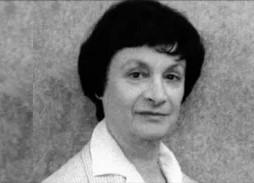 |
|
| Betty A. Prashker | |
Betty A. Prashker, "a pioneering woman in the book business who published the feminist classics Sexual Politics by Kate Millett and Backlash by Susan Faludi, but who also brought out racy commercial fiction by Judith Krantz and Jean M. Auel--viewing their frank female sexuality as no less a statement of feminist empowerment," died July 30, the New York Times reported. She was 99. Prashker was a top editor and executive at Doubleday and Crown during her career. Toward the end of her career, she was an editor-at-large at Crown, working with select authors. [Read Prashker's account of her career in her own words--her contribution to Among Friends: An Illustrated Oral History of American Book Publishing & Bookselling in the 20th Century--in the Deeper Understanding section below.]
A Vassar graduate, Prashker's first job in publishing came in 1945 as a reader of unsolicited manuscripts for Doubleday because men who would otherwise have taken such jobs were still at war, the Times noted, adding that after marrying in 1950, she set her career aside for a decade to raise a family before rebelling at the role of homemaker.
Returning to the workplace, she was rehired by Doubleday and soon heard of a Columbia graduate student, Millett, who was working on a writing project. Prashker didn't like what Millett showed her, but asked if she had anything else. Millett sent over her Ph.D. dissertation, Sexual Politics, and Prashker was so excited about the work, she later recalled, that her pitch to a company sales meeting was met with applause. The landmark book was published in 1970.
In 1981, she told Isaac Asimov he should write a sequel to his 1950s Foundation trilogy. When the author resisted the request, Doubleday insisted, and a year later he submitted Lightning Rod, which was retitled Foundation's Edge (1982) and became one of Asimov's most popular books.
Erik Larson, the author of The Devil in the White City (2003) and other bestselling works of nonfiction, was someone else Prashker helped steer to a new level of success. "She was a terrific editor," Larson said. "She had a rare knack for being noninterventionist. She'd take what you gave her and make it better by cutting things out and tying things together without getting in your face."
Prashker moved to Crown in 1981, after 21 years at Doubleday, and was named a v-p and editor in chief. She became an immediate champion of Faludi's Backlash: The Undeclared War Against American Women. "I remember Betty being the one editor I met with when we were pitching Backlash who understood--instantly--what I was trying to do and the need for such a book in the bleak '80s," Faludi said. "Most of the other editors seemed either oblivious to what women were up against or convinced that feminism had achieved its aims."
Throughout her career, Prashker was known as an advocate for other women in publishing, and for equal pay in an industry that had long been male-dominated. "She was determined that she was going to elevate as many women as she could," said Rachel Kahan, a v-p and executive editor at William Morrow, whom Prashker took under her wing when Kahan was an industry newcomer.
Prashker also championed popular fiction by and for women, including works by Judith Krantz and Jean Auel. "She was not a snob about what she published," Kahan said. "Jean Auel wrote these fabulous cave-man sexy novels. Treating women's sexual adventures as something they don't have to apologize for--it was and in many ways still is a political statement."
"Without Betty, there would have been no Crown Publishing as we know it," Tina Constable, a Penguin Random House executive v-p and publisher and former Crown publisher, said in a statement. "I am just one of many colleagues who benefited greatly from her experience, and from her unwaveringly championing advancement and higher pay for women in publishing."

